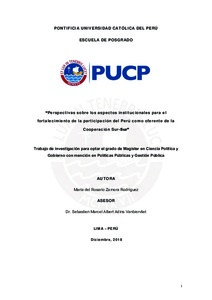| dc.contributor.advisor | Adins Vanbiervliet, Sebastien Marcel Albert | |
| dc.contributor.author | Zamora Rodríguez, María del Rosario | es_ES |
| dc.date.accessioned | 2019-02-11T23:15:11Z | es_ES |
| dc.date.available | 2019-02-11T23:15:11Z | es_ES |
| dc.date.created | 2018 | es_ES |
| dc.date.issued | 2019-02-11 | es_ES |
| dc.identifier.uri | http://hdl.handle.net/20.500.12404/13472 | |
| dc.description.abstract | La dinámica y la identidad de los sujetos de la Cooperación Internacional han
experimentado sustanciales variaciones en este nuevo siglo, entre ellas la modalidad
de Cooperación Sur-Sur (CSS) se ha incrementado gracias al sostenido crecimiento
económico del “sur global” ya que dispone de recursos para reducir la pobreza y
financiar el desarrollo, no solo dentro de su territorio, sino más allá de sus fronteras, a
través de la ejecución de proyectos y acciones, con los cuales transfiere sus
capacidades y experiencias adquiridas. En este escenario, el país busca posicionarse como una economía de renta media alta. Cuenta con conocimiento adquirido y generado con el apoyo de los donantes tradicionales el Perú ya cuenta con las capacidades suficientes para impulsar la modalidad CSS. La agenda exterior al Desarrollo ya prioriza esta modalidad de ayuda, debido a las experiencias positivas de países vecinos que podrían ser aprovechadas en el diseño de la estrategia que Perú requiere implementar para el desarrollo de su rol dual, como oferente y beneficiario de cooperación internacional. Para poder efectuar el análisis comparativo se mira a Colombia, dado el incremento en el número de proyectos y acciones de CSS ofrecidos e implementados. Por consiguiente, el artículo permite concluir que sí es posible contribuir con la consecución de los objetivos de la política exterior peruana, a través del fortalecimiento la oferta de la CSS. Teniendo en cuenta la experiencia colombiana y de las debilidades mostradas por el Perú, y con la mirada a incrementar la oferta de la CSS por parte de Perú es: incidir en la formación de capacidades de los funcionarios de la Agencia Peruana de Cooperación Internacional-APCI, mejorar los instrumentos de gestión, en el marco de la Política Nacional de Modernización de la Gestión Pública de la citada Agencia, y procurar nuevos recursos | es_ES |
| dc.description.abstract | The dynamics and identity of the subjects of the International Cooperation have
undergone substantial changes in this new century, among them the South-South
Cooperation (CSS) modality has increased thanks to the sustained economic growth of
the "global south" since it has resources to reduce poverty and finance development,
not only within its territory, but beyond its borders, through the execution of projects
and actions, with which it transfers its acquired capacities and experiences. In this scene, the country seeks to position itself as a upper middle-income economy. It
has knowledge acquired and generated with the support of traditional donors and Peru already has sufficient capacities to promote the CSS modality. The external development agenda already prioritizes this type of aid, due to the positive experiences of neighboring countries that could be exploited in the design of the strategy that Peru needs to implement in order to develop its dual role, as a provider and beneficiary of international cooperation. To we are able to carry out the comparative analysis, we look at Colombia, who increases in the number of CSS
projects and actions offered and implemented. Therefore, the article allows us to conclude that it is possible to contribute to the achievement of the objectives of Peruvian foreign policy, by strengthening the CSS offer. Taking into account the Colombian experience and the weaknesses shown by Peru and with the aim of increasing the supply of CSS by Peru is necessary: to enfasy the capacity building of APCI officials, and improve management tools, within the framework of the National Policy of Modernization of Public Management of the aforementioned Agency, and seek new resources | es_ES |
| dc.description.uri | Trabajo de investigación | es_ES |
| dc.language.iso | spa | es_ES |
| dc.publisher | Pontificia Universidad Católica del Perú | es_ES |
| dc.rights | info:eu-repo/semantics/openAccess | es_ES |
| dc.rights.uri | http://creativecommons.org/licenses/by-nc-nd/2.5/pe/ | * |
| dc.subject | Cooperación internacional | es_ES |
| dc.subject | Desarrollo económico--Perú | es_ES |
| dc.subject | Perú--Política exterior | es_ES |
| dc.subject | Colombia--Política exterior | es_ES |
| dc.title | Perspectivas sobre los aspectos institucionales para el fortalecimiento de la participación del Perú como oferente de la Cooperación Sur-Sur | es_ES |
| dc.type | info:eu-repo/semantics/masterThesis | es_ES |
| thesis.degree.name | Magíster en Ciencia Política y Gobierno con mención en Políticas Públicas y Gestión Pública | es_ES |
| thesis.degree.level | Maestría | es_ES |
| thesis.degree.grantor | Pontificia Universidad Católica del Perú. Escuela de Posgrado | es_ES |
| thesis.degree.discipline | Ciencia Política y Gobierno con mención en Políticas Públicas y Gestión Pública | es_ES |
| renati.discipline | 312167 | es_ES |
| renati.level | https://purl.org/pe-repo/renati/level#maestro | es_ES |
| renati.type | http://purl.org/pe-repo/renati/type#trabajoDeInvestigacion | es_ES |
| dc.publisher.country | PE | es_ES |
| dc.subject.ocde | https://purl.org/pe-repo/ocde/ford#5.06.00 | es_ES |






